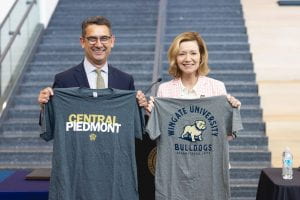Central Piedmont Community College and Wingate University announced today the launch of the Gateway to Wingate program – a new pathway to a bachelor’s degree for Central Piedmont students that will expand college access.

Wingate University president Dr. Rhett Brown and Central Piedmont President Dr. Kandi Deitemeyer, at the Gateway to Wingate announcement.
Gateway to Wingate students who complete an Associate in Science (AS), Associate in Arts (AA), or Associate in Fine Arts (AFA) at Central Piedmont with a cumulative grade-point average of 2.50, and are in good academic standing, will be guaranteed admission to Wingate University.
When enrolled, Gateway to Wingate students will receive, free of charge:
- access to Student Success Services
- collaborative academic advising
- collaborative financial aid counseling
- collaborative career counseling
- long-term planning for admission and preparation for Wingate University graduate programs
- Gateway to Wingate students also are eligible for the Gateway Scholarship. Gateway Scholarship recipients will pay no more than $2,500 per year in tuition at Wingate.
Central Piedmont students can enter the program as soon as the start of the 2022 fall semester in August. A separate agreement provides a pathway for qualified Central Piedmont students to enter Wingate’s Doctorate of Pharmacy program, which has facilities in Wingate and in Hendersonville, N.C. Since 2018, more than 80 Central Piedmont students have transferred to Wingate. Both institutions expect this number to grow significantly with the launch of the Gateway to Wingate program.
“We are excited and honored to announce this public-private partnership, knowing it will be a great benefit to Central Piedmont students who want to pursue a bachelor’s degree,” said Dr. Kandi Deitemeyer, Central Piedmont president. “We are thrilled to offer this option and pathway to our students who will grow and thrive at Wingate, where they will enjoy smaller class sizes, superb advising, excellent teaching, and a supportive campus community.
“At the same time, this transfer pathway is a wonderful example of higher education partners in the Charlotte region working together to broaden access to a bachelor’s degree and greater opportunities beyond,” Deitemeyer added.
